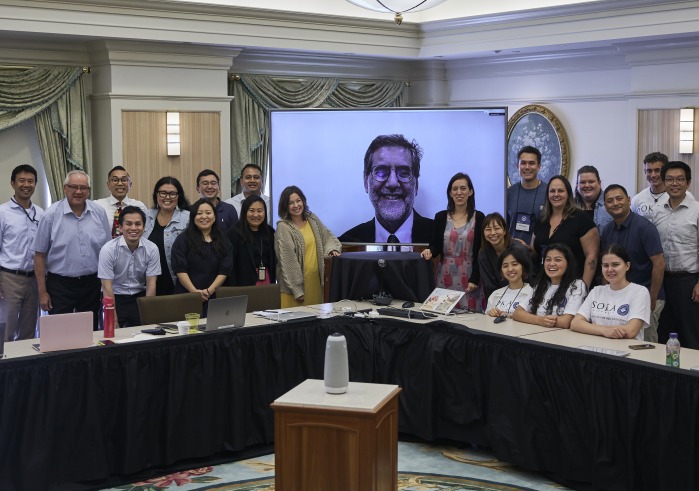SUA Alumni Discuss Expanding Global Citizenship Education at Inaugural Conference

Exploring how to bring the principles of global citizenship into classrooms from pre-kindergarten through high school led to lively discussions among the Soka University of America alumni who returned to campus for the first event devoted to the topic.
The conference brought together 15 alumni working in the education field for the inaugural PreK-12 Global Citizenship Education conference. The July 2023 gathering was spearheaded by the Soka Institute for Global Solutions (SIGS), which promotes global citizenship education knowledge and practices while building a network of citizens who seek pragmatic solutions to the world’s most challenging global problems.
During the three-day event, attendees explored ideas and practicalities of teaching global citizenship. They looked at ways to incorporate learned and understood values of a global citizen in activities and curriculum, including communal learning and the interconnectedness between students and their teachers. Another key topic: creating a diverse network or toolkit for educators that reflects a shared understanding of humanistic principles in education. Building such a network of individuals and institutions working toward a more peaceful society would further SUA founder Daisaku Ikeda’s concept of a “humanistic philosophy of sovereignty,” from his 1987 peace proposal outlining the vision that inspired the establishment of SIGS, fostering leaders who engage with global challenges based on their commitment to protecting the dignity of all human life.
The conference concluded with groups of alumni presenting their findings to the full gathering and guests, including SUA President Edward Feasel and SIGS Executive Director Andrea Bartoli.
“We are in a crisis of hope, yet our SIGS participants, grounded in their growing and diverse personal experiences, are creative and tenacious,” said Monte Joffee, chair of the board of directors of the Renaissance Charter Schools in New York and an adviser to the working group that helped plan the conference.
Nitesh Sil ’11, who runs a language school in Japan, returned to SUA’s campus eager to share ideas and experiences with other alumni educators. After all, it was his experience at SUA that inspired his career choice.
“Global citizenship education for me is human education,” said Sil. “It’s the development of the whole person…an individual who is focused on transforming their inner life and with a deep intent to serve others. One of the biggest influences that I had at SUA was the deep connection between professors and students, and then students and their peers, and not just limited to that but also the people that you interact with within campus and off campus.”
After graduating and seeing a sense of “directionless” in many young people, Sil dedicated his career “to recreating Soka’s environment where there is none.” As an educator, he said he takes a dialogic approach to helping students, staff, and parents, as well as keeping the ideals of global citizenship in mind throughout curriculum development. The challenge, he said, is to remain focused on value-creating education in a system based on standardized tests and college preparation.
Erika Starzynski ’06 was also discouraged by the existing education system before she began working as a resource teacher at the Toronto Waldorf School, where she has been able to bring in some of the principles and values she experienced at SUA. A Waldorf education, she told a group of alumni during the conference, shares many themes with global citizenship education, including a focus on the relationship between students and teachers and a spiritual foundation to its pedagogy.
“In a Waldorf education, a teacher’s inner work and transformation is also of primary importance,” she said. “Who you are is just as important as what you are bringing.”
At the event’s end, Sil said he was leaving with a renewed appreciation for Soka’s culture of care and its foundation of supporting each and every student. Reaffirming his commitment to dialogue, he was reminded that value-creating dialogue is an active process notable for its deep intent to create value for everyone, under any circumstance. “It’s always to bring out the best in each other,” he said, adding that the conference helped him understand more about using it in the context of his work.
Going forward, the alumni working group and SIGS will continue to build on their work with online meetings and other interactions to explore more routes to expanding global citizenship education in classrooms around the world, with the second conference projected to take place in July 2024.
